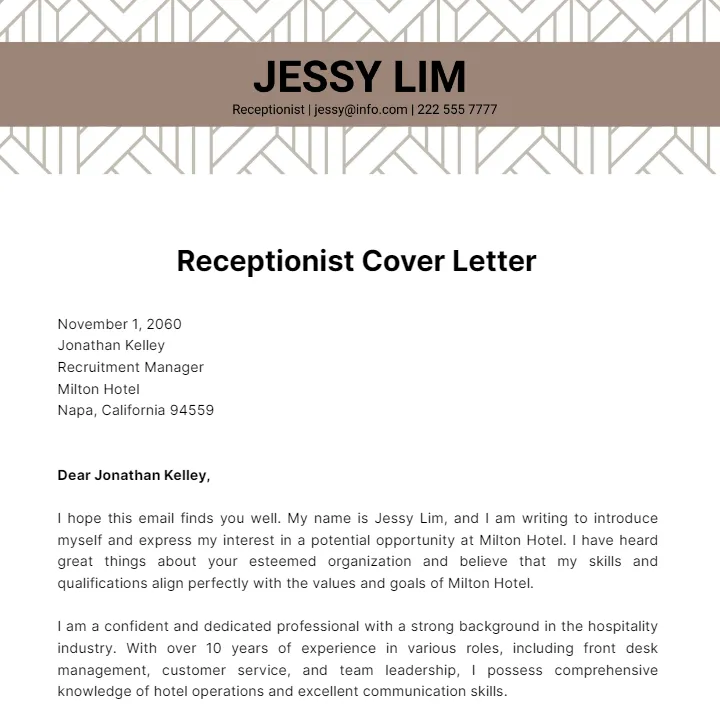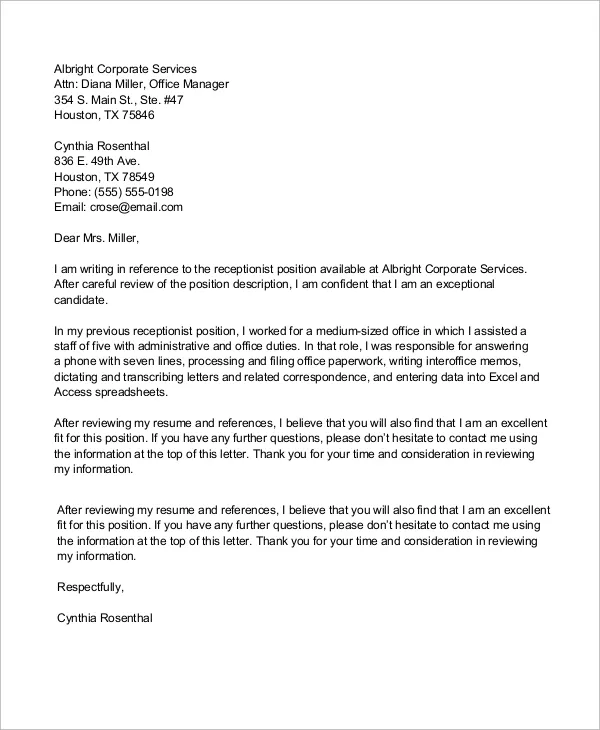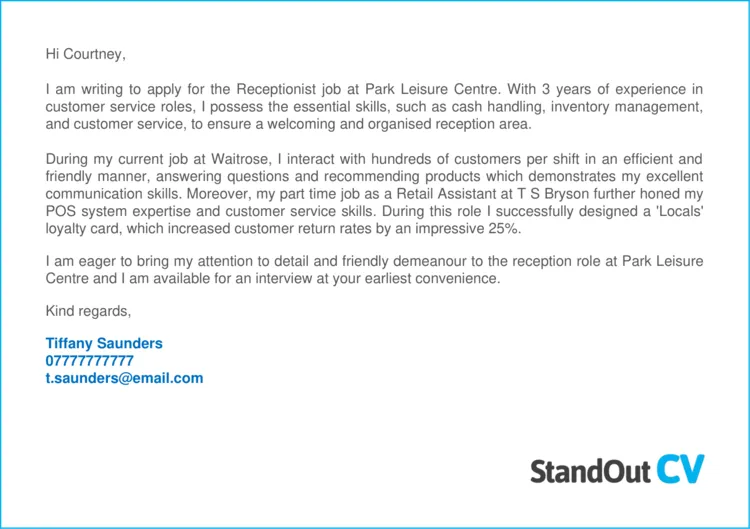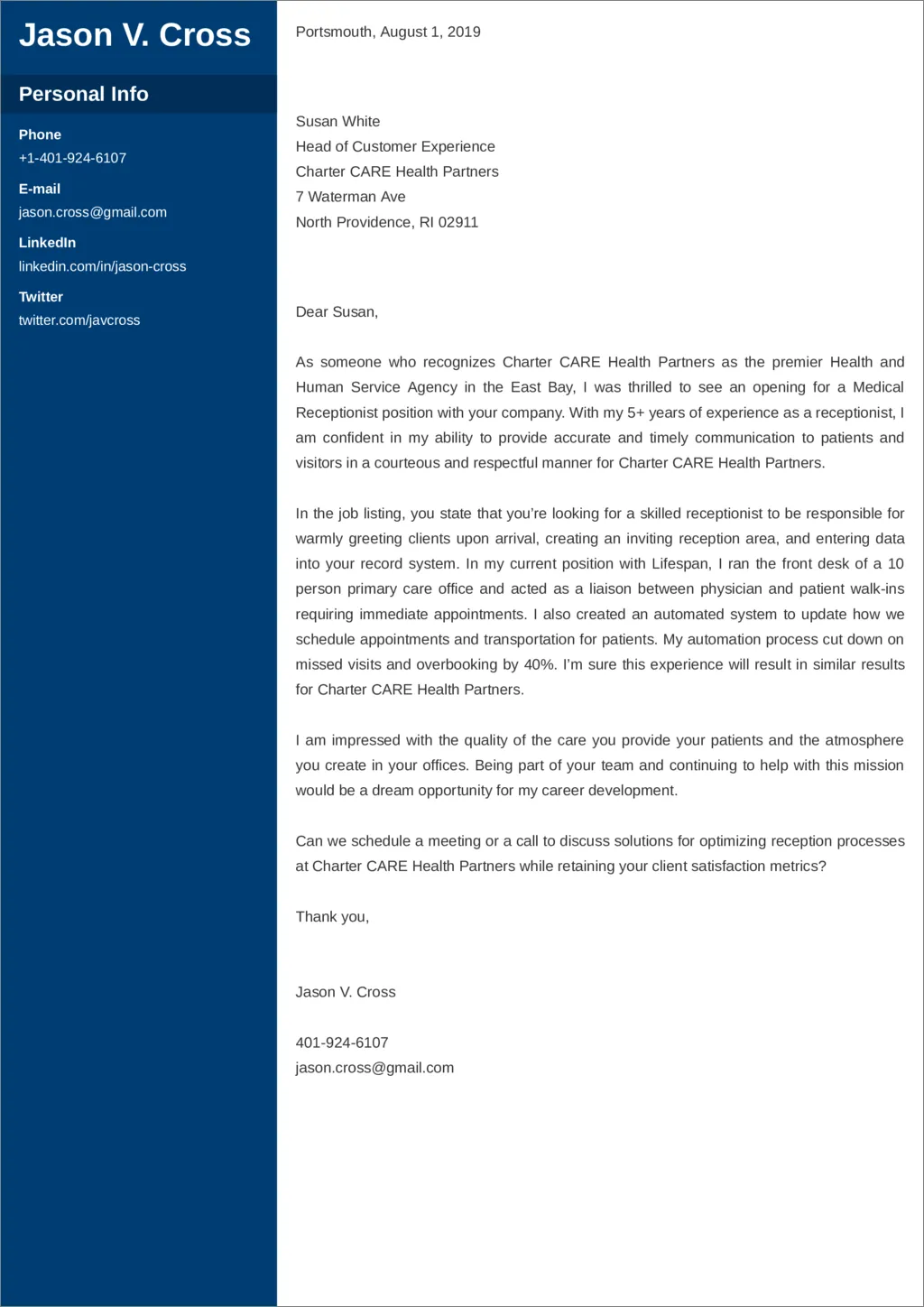Why a Receptionist Cover Letter Matters
In the competitive job market, a well-crafted receptionist cover letter can be your secret weapon. It is more than just a formality; it is your first opportunity to make a strong impression on potential employers. A compelling cover letter provides a platform to showcase your personality, skills, and enthusiasm for the role. It allows you to go beyond your resume and paint a vivid picture of why you are the perfect fit for the receptionist position. By highlighting relevant experience, demonstrating your communication skills, and expressing genuine interest in the company, you can significantly increase your chances of landing an interview and ultimately securing the job. A cover letter is your chance to stand out from the crowd and make a memorable impact, setting the stage for a successful application process. Don’t underestimate the power of a well-written cover letter – it is your key to opening doors and achieving your career goals.
Key Elements of a Great Receptionist Cover Letter
A successful receptionist cover letter is composed of several key elements that work together to create a persuasive and professional document. Start with your contact information and a professional salutation. Following this, you should craft an opening paragraph that immediately grabs the reader’s attention. This could be a brief, enthusiastic statement about your interest in the role or a compelling anecdote that highlights your skills. The body of the letter should emphasize relevant skills and experience, such as communication, organization, and customer service. Showcase your soft skills, including your ability to work well under pressure, manage multiple tasks, and maintain a positive attitude. Include specific examples to support your claims. Quantify your achievements with numbers and use strong action verbs to demonstrate your capabilities. Finally, tailor your letter to the specific job description and close with a call to action, inviting the employer to contact you for an interview.
Contact Information and Salutation

Begin your cover letter with your contact information. This should include your full name, address, phone number, and professional email address. Ensure this information is accurate and easy to find at the top of the letter. Next, address the hiring manager or the specific person mentioned in the job posting, if possible. If a name is not provided, a general salutation like “Dear Hiring Manager” is acceptable. Avoid generic greetings like “To Whom It May Concern,” as they lack a personal touch. Using the hiring manager’s name, if available, demonstrates that you have taken the time to research the company and pay attention to detail. This personal touch can make a significant positive impact. The opening of your cover letter sets the tone for the entire document, so make sure you start with a polished and professional presentation to make a great first impression. Double-check all contact details for accuracy to ensure the hiring manager can easily reach you.
Opening Paragraph Hooking the Reader
The opening paragraph of your cover letter is your chance to capture the reader’s attention from the start. Instead of a generic opening, try to immediately engage the hiring manager. Start with a statement of your enthusiasm for the position and the company. Briefly explain why you are excited about the opportunity. You could also start with an anecdote or a concise statement about your most relevant skills. For example, if the job description emphasizes customer service, you might begin with a short story illustrating your excellent customer service skills. The goal is to provide a quick, compelling reason for the hiring manager to keep reading. Tailor your opening to the specific job and company. Show that you have researched the company and understand their values. This will make your cover letter stand out from the many other applications they receive. A strong opening sets the stage for a well-received application, showcasing your professionalism and skills.
Highlighting Relevant Skills and Experience
In the body of your cover letter, focus on the most relevant skills and experiences. Emphasize your skills as they relate to the receptionist role. This includes excellent communication, organizational abilities, and strong customer service skills. Provide specific examples of how you have demonstrated these skills in the past. If you have previous experience as a receptionist, describe your key responsibilities and accomplishments. For instance, you could mention your experience managing phone calls, scheduling appointments, or handling customer inquiries. If you are new to the field, focus on transferable skills from other positions, such as retail or administrative roles. Highlight the tasks that show your ability to interact with people, solve problems, and manage a busy environment. Use action verbs like “managed,” “coordinated,” “resolved,” and “assisted” to bring your achievements to life. Provide concise explanations to make your experience compelling. Ensure your cover letter aligns perfectly with the job description to maximize your impact.
Showcasing Soft Skills Communication and Interpersonal Abilities

Soft skills are extremely valuable for a receptionist, so be sure to showcase them in your cover letter. These are skills that define how you interact with people and handle various situations. Communication is critical; demonstrate your ability to speak clearly, listen attentively, and write professionally. Give examples of how you have used these skills to resolve customer issues or communicate effectively with colleagues. Highlight your interpersonal skills, such as your ability to build rapport, be empathetic, and remain positive. Describe how you handle stressful situations, manage conflicts, and maintain a friendly demeanor. Mention your adaptability and willingness to learn. Receptionists often handle many tasks at once. Include examples of how you prioritize tasks, manage your time, and stay organized. Demonstrate that you possess the necessary emotional intelligence and people skills. By illustrating your soft skills, you show the employer that you are not only qualified but also a great fit for their company culture.
Quantifying Achievements and Using Action Verbs
To make your cover letter more impactful, quantify your achievements with numbers and use strong action verbs. Instead of just saying you improved customer satisfaction, state by what percentage. For example, “Increased customer satisfaction scores by 15% through improved communication and problem-solving.” Action verbs help showcase your skills and experience in a dynamic way. Start each sentence with an action verb to make your accomplishments more immediate and engaging. Using verbs such as “managed,” “coordinated,” “implemented,” and “resolved” immediately shows your capabilities. Instead of saying you answered phones, say “managed a high volume of calls.” This shows you’re not only answering calls but also capable of handling a large workload. When you provide numbers and data, your claims become more credible. This approach makes your cover letter more effective, presenting you as a results-oriented candidate. The use of action verbs and concrete numbers will make your cover letter stand out.
Tailoring Your Cover Letter to the Job Description
Tailoring your cover letter to the specific job description is essential for making a strong impression. Begin by carefully reading the job posting to identify the key requirements and preferred qualifications. Highlight the skills and experiences that match those requirements. Use the same keywords and phrases from the job description throughout your cover letter. This will help the hiring manager quickly recognize your qualifications. Include specific examples of how you have demonstrated the required skills in the past. If the job description requires experience with a specific software or technology, mention your proficiency. If the job focuses on customer service, provide examples of how you have provided excellent service. Customize your cover letter for each job application instead of using a generic version. Showing that you have researched the company and understand their needs, demonstrates your genuine interest. This approach increases your chances of landing an interview, making your application stand out from others.
Formatting and Proofreading for Professionalism

Formatting and proofreading are critical aspects of your cover letter. They can impact your ability to make a professional impression. Choose a clean, easy-to-read font, such as Arial or Times New Roman, and use a standard font size of 11 or 12 points. Ensure your cover letter is well-structured. Use clear headings and paragraphs to break up the text and make it easy to read. Proofread your cover letter meticulously for any spelling, grammar, or punctuation errors. Errors can undermine your credibility. Ask a friend or family member to review your letter as well. A fresh pair of eyes can catch mistakes that you may have missed. Always double-check your contact information and make sure it’s accurate. A mistake in this section could lead to a missed opportunity. Pay attention to the overall appearance of your cover letter to ensure it is professional. The small details make a big difference in creating a great first impression.
Closing the Letter and Call to Action
Conclude your cover letter with a strong closing that summarizes your interest and encourages the hiring manager to contact you. Thank the hiring manager for their time and consideration. Reiterate your enthusiasm for the position and the company. Include a clear call to action by expressing your availability for an interview. Provide your contact information again, and make it easy for them to reach you. For example, you can say, “I am eager to discuss my qualifications further and can be reached at [phone number] or [email address].” End your cover letter with a professional closing, such as “Sincerely” or “Best regards,” followed by your full name. A well-written closing reinforces your professionalism and demonstrates your interest in the position. A strong closing can be the deciding factor that encourages the hiring manager to move your application forward.
